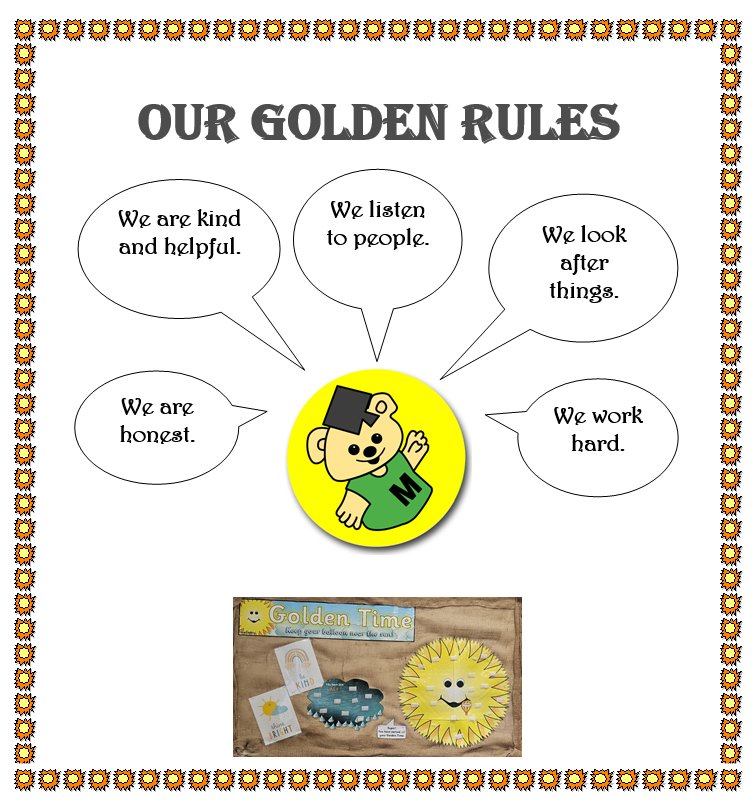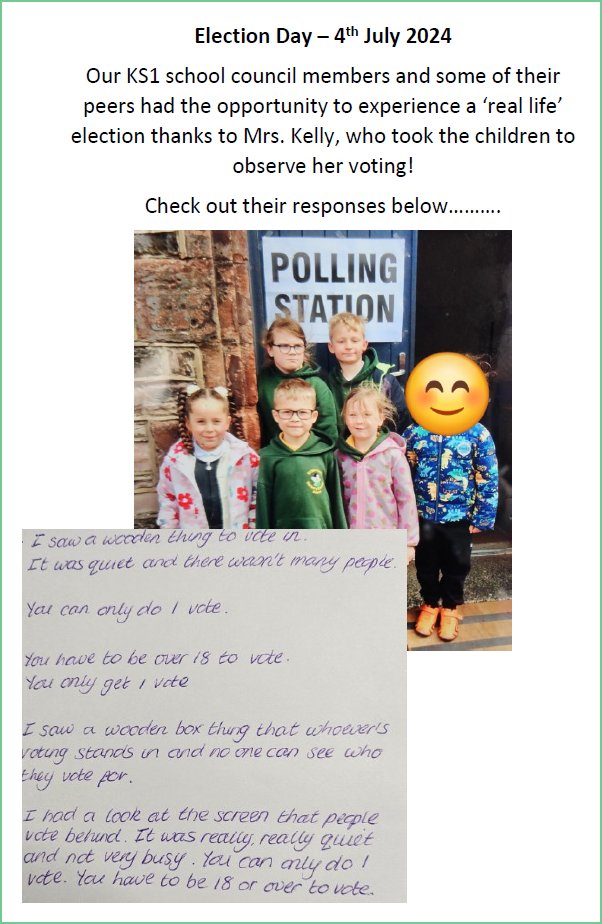Promoting British Values at St Michael’s Nursery and Infant School

As directed by the Department for Education, schools have a duty to actively promote the fundamental British values of democracy; the rule of law; individual liberty; mutual respect and tolerance of those with different faiths and beliefs.
These values were first set out by the government in the ‘Prevent’ strategy in 2011. In November 2014, schools were required to have a strategy for embedding these values and showing how their work with pupils has been effective in doing so.
At St Michael’s Nursery and Infant School we uphold and teach pupils about British Values which are defined as:
- Democracy
- Rule of law
- Individual liberty
- Mutual respect
- Tolerance of those of different faiths and belief
These values are taught explicitly through SMSC (spiritual, moral, social and cultural development) and Religious Education (RE). We also teach British Values through planning and delivering a broad and balanced curriculum. Alongside this we also support a number of charities which we feel enables our children to think of others and work to support others in a wider context than our school community.This is demonstrated each Christmas when we send parcels around the world through ‘Operation Christmas Child.’


The school takes opportunities to actively promote British Values through daily assemblies and whole school systems and structures such as electing and running a successful School Council and appointing playground and lunchtime ‘Buddies.’ We also actively promote British Values through ensuring that our curriculum planning and delivery includes real opportunities for exploring these values.
Democracy
Democracy is an important value at our school. Pupils have the opportunity to have their voices heard through various pupil voice groups. The elections of members of many of these groups is based on pupil votes. This supports pupils to understand how citizens can influence decision-making through the democratic process. Our School Councillors are able to genuinely effect change within the school and are actively involved in monitoring and supporting school development with the help of Mrs Reay, our School Council Champion.

The principle of democracy is also explored in the curriculum as well as during assemblies and special days. The school makes a point of marking and celebrating days of national significance and memorial. Examples we have celebrated include: Chinese New Year, Remembrance Day and Armed Forces Day.

The Rule of Law
The importance of laws and rules, whether they are those that govern the class, the school or the country, are consistently reinforced throughout regular school days, as well as when dealing with behaviour and through school assemblies.
Our system for behaviour is aligned to an agreed set of rules (Golden Rules).
Visits from authorities such as the police, fire service etc. are regular parts of our calendar and help reinforce this message.


To encourage and promote good behaviour, attitude and work, we have devised a reward system which is consistently followed throughout the school. We are committed to praising children’s efforts. We endeavour to praise the children informally, individually, during group work, in front of the whole class and the whole school. Children are rewarded not only for achievement in curriculum areas, but also for behaviour, less academic successes and out of school achievements. Rewards are given in the form of stickers, prizes and certificates. Children’s achievements are also recognised during our Celebration Assembly each Friday.
The school aims to provide an appreciation that living under the rule of law protects pupils and is essential for their safety and well-being.
The Behaviour and Anti-Bullying policies set out a zero tolerance baseline for any form of aggression, abuse or violence, which extends to pupils, staff and parents and carers.
Individual Liberty
Pupils are actively encouraged to make choices at our school, knowing that they are in a safe and supportive environment. As a school we provide boundaries for our children to make choices safely, through the provision of a safe environment and planned curriculum.
Pupils are encouraged to know, understand and exercise their rights and personal freedoms and are advised how to exercise these safely, for example through our e-Safety teaching and our PSHE education. K.S our friendly monkey teaches all children about this in ‘Kidsafe’

Pupils are given the freedom to make choices, e.g. signing up for extra-curricular clubs. EYFS pupils are given the freedom to self-select their learning activities – ‘choosing time’. All pupils are encouraged to make personal choices about the food they eat.
Vulnerable pupils are protected and stereotypes challenged. A strong anti-bullying culture is embedded in the school and any form of bullying is challenged and addressed. The school governing body has taken an active role in this. The school also operates a robust system of logging incidents.
Mutual Respect
Part of our school ethos and behaviour policy are based around mutual respect and listening to others. All staff model this behaviour.
Children learn that their behaviours have an effect on their own rights and those of others.
Through assemblies and SMSC our pupils understand how to support others, ask for help and work with resilience when tasks are challenging.
In PE the children take part in training and many compete in tournaments. The value of the training and tournaments is sportsmanship. Children are reminded to show mutual respect towards other players at all times.

Staff and pupils always challenge any prejudicial or discriminatory behaviour though incidence is rare.
Tolerance of Those of Different Faiths and Beliefs
This is achieved through enhancing pupils’ understanding of their place in a culturally diverse society and by giving them opportunities to experience such diversity in our local community which is by large white British; but ever changing.
Assemblies and discussions involving prejudices and prejudice-based bullying have been followed and supported by learning in RE and PSHE. We follow the ‘Cumbria Agreed Syllabus for RE’ and the children study six worldwide religions during their time at St Michael’s.




